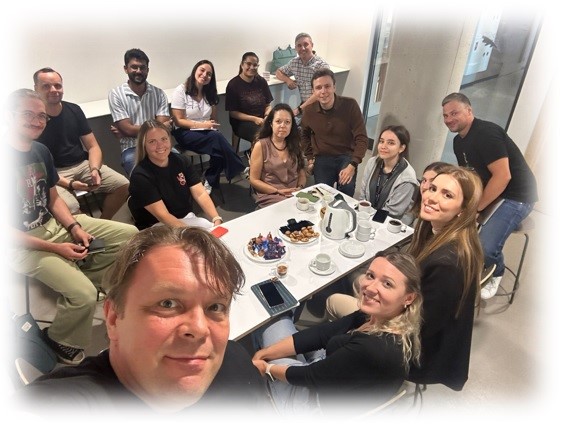Head of the laboratory: Dr. Maksym Pogorielov

The Advanced Biomaterials and Biophysics (Bioiterface) Laboratory aims to develop innovative materials and technologies at the interface of biology and physics, addressing critical challenges in regenerative medicine, antimicrobial resistance, and advanced diagnostics. By leveraging cutting-edge nanomaterials, bioinorganic hybrid systems, and biophysical tools, the laboratory seeks to enhance understanding and application of biointerfaces and biomaterials for improved healthcare outcomes.
Main directions of scientific work:
1. Development of Advanced Biomaterials
- Design and synthesis of novel biomaterials, such as MXene-based scaffolds, electrospun membranes, and hybrid bioinorganic composites, tailored for tissue engineering, wound healing, and biomedical applications.
- Functionalization of biomaterials for enhanced biocompatibility, conductivity, and antimicrobial properties.
2. Exploration of Biointerfaces
- Investigation of cell-material interactions to optimize biomaterial designs for improved cell adhesion, proliferation, and differentiation.
- Investigation of fundamental mechanisms of biomaterials / cells interractions
- Study of molecular transport mechanisms in low-dimensional hybrid materials for enhanced drug delivery and biosensor applications.
3. Research on Antimicrobial Resistance
- Evaluation of the antimicrobial efficacy of composite materials incorporating nanoparticles (e.g., silver, copper, MXene) against antibiotic-resistant pathogens.
- Development of photothermally active materials for targeted bacterial inactivation.
4. Regenerative Medicine Applications
- Creation of scaffolds and hydrogels for cardiac tissue engineering, with a focus on angiogenesis and bioactive molecule delivery.
- Development of neural conduites and materials for nerve tissue regeneration
- Elaboration of conductive biomaterials for tissue engineering, sensors and flexible electronics
5. Biophysical Characterization
- Use of advanced techniques such as UV-Vis spectroscopy, Dynamic Light Scattering (DLS), and microscopy to characterize material properties, stability, and interactions with biological systems.
- Development of predictive models for material performance under physiological conditions.
6. Collaboration and Knowledge Exchange
- Strengthening international cooperation with academic and industrial partners, including collaborations under existing projects like IMPRESS-U and Horizon Europe.
- Hosting workshops, symposia, and training programs to promote the dissemination of knowledge and foster innovation.
7. Sustainability and Commercialization
- Exploration of environmentally friendly synthesis methods and materials to align with sustainable development goals.
- Development of strategies for scaling production and commercialization of advanced biomaterials in collaboration with industrial partners.
Projects
Electro-conductive polymeric 3D scaffolds as novel strategies for biomedical applications (ESCULAPE)
Inovatīvie divdimensiju nanomateriāli melanomas fototermiskajai terapijai
Advancing Immune Defense of Pancreatic β-Cells through Innovative Tissue Engineering Scaffolds
Towards development of new antibacterial strategy for dentistry
Towards MXenes’ biomedical applications by high-dimensional immune MAPping (ARGO)
Design and implementation of silver-based nanoparticles for combating antibiotic resistance (VARIANT)
Novel copper-loaded wound healing patches with advanced regeneration capacity and antibacterial effect (accomplished)
Tailored Molecular Transport in Low-Dimensional Hybrid Materials from 1D Nanocrystals and 2D Nanosheets (accomplished)
Jauna fotoluminescences platforma Listeria mono citogēnu noteikšanai (accomplished)
-
Laboratory of Atomic and Atmospheric Physics and Photochemistry
-
Laboratory of High-Resolution Spectroscopy and Light Source Technology
-
Biophotonics Laboratory
-
Quantum Optics Laboratory
-
Laboratory of Optical Biosensors and Functional Nanomaterials
-
Laboratory of Theoretical Physics
-
Advanced Biomaterials and Biophysics Laboratory

 CONFERENCE
CONFERENCE